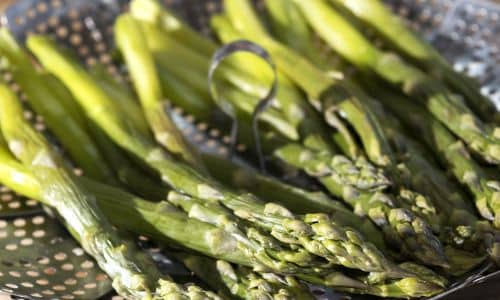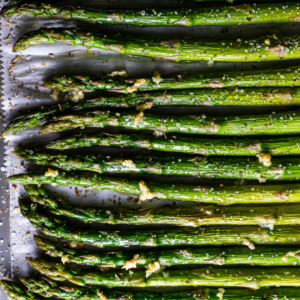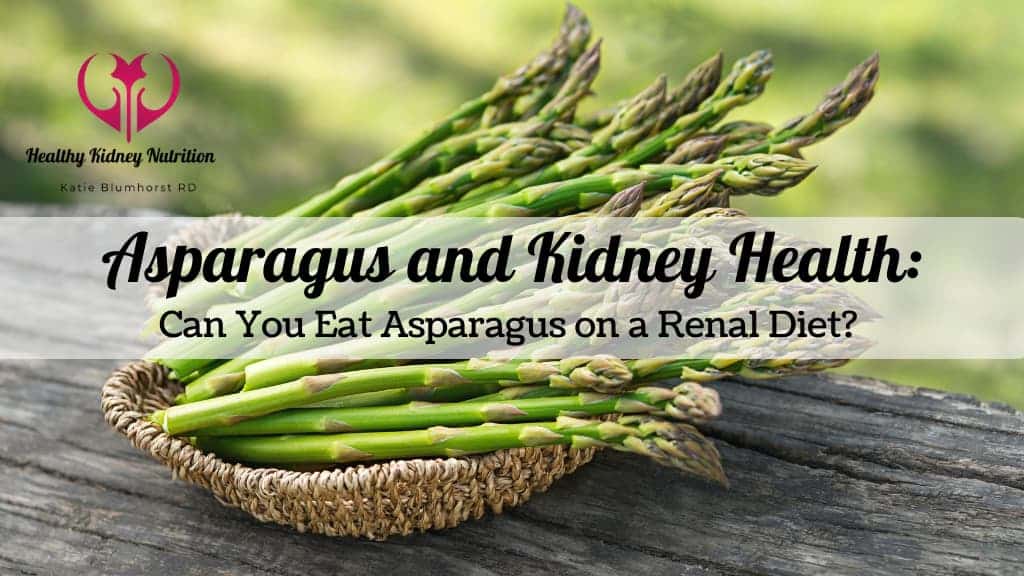Asparagus is a popular and nutritious vegetable that finds its way into many dishes. But for individuals with kidney failure, dietary choices often require careful consideration.
Embarking on a renal diet journey can be challenging, especially when you’re a fan of delicious, nutrient-packed vegetables like asparagus. In this article, we’ll delve into the question: Can you eat asparagus on a renal diet? Let’s explore the nutritional benefits, potential concerns, and recommendations for including asparagus in a renal diet.
Table of Contents
Understanding the Renal Diet
Before diving into the specifics of asparagus, let’s acquaint ourselves with the fundamentals of a renal diet. Tailored for individuals with kidney concerns, this dietary approach mostly revolves around managing potassium, phosphorus, and sodium intake. By limiting these electrolytes in the diet, they won’t build up in the blood and cause other health problems.
Potassium
The renal diet can look differently for those with kidney disease. Nutritional needs depend on the stage of kidney disease they’re in or if receiving dialysis treatments. It’s essential for those on dialysis to limit potassium intake to 2,000 mg or less per day. However, a person receiving frequent dialysis (5-6 days a week) may need to consume more potassium in their diet.
For those with CKD not on dialysis, potassium requirements depends on the individuals needs. A history of high potassium blood levels is also important to consider.
Phosphorus
Like potassium, phosphorus can build up in the blood if eaten in excess for those with low kidney function. Generally, avoiding highly processed foods containing added phosphorus can help keep phosphorus blood levels at desired ranges.
The body absorbs phosphorus in processed foods quite easily. Added phosphorus can impact phosphorus levels more than foods with natural occurring phosphorus.
Sodium
The renal diet limits sodium to 2,000 mg per day. This helps to keep blood pressure at a healthy range and to avoid excess fluid build up in the body. A person following a low sodium diet can achieve this by choosing fresh foods and using low sodium seasonings. Most of the sodium we consume is already in the food item itself. Reading food labels can help determine if a particular food fits in the sodium limits for the day.
Fluid
Fluid requirements vary as well for those following a renal diet. For those that don’t make much urine may need to restrict fluid. The recommendations is 1.5 liters per day or 32 fluid ounces. While others may need to drink to thirst. Reducing sodium consumption can make following a fluid restriction much easier as it won’t cause an increase in thirst.
As you can see, the renal diet principles can be applied to people with chronic kidney disease. Dietary needs are tailored to the individual’s unique needs and situation. This is why most people are confused by trying to apply this diet into their lifestyle on their own. Seeking professional guidance from a renal dietitian can help one determine what foods are right for them.

Asparagus and the Renal Diet
The kidneys have various important functions. One of which is excreting waste products such as excess potassium, phosphorus, and fluids. Healthy kidneys are able to get rid of waste products and electrolytes by eliminating the excess through the urine.
However, when people with decreased kidney function consume too much potassium and phosphorus in their diet, the kidneys can’t get rid of the excess so the minerals can build up in the body causing elevated levels in the blood.
When including fruits and vegetables in your diet, potassium needs are considered. Fruits and vegetables, like asparagus, contain potassium. For those with very little kidney function or receiving dialysis treatment may need to limit potassium in their diet.
Potassium Content in Asparagus
One key consideration for individuals with renal disease is the potassium content in foods. Asparagus contains a moderate amount of potassium, which is an essential mineral for overall health. However, for those with compromised kidney function, excessive potassium intake can be problematic.
High potassium levels may lead to complications such as high levels of potassium in the blood, which can affect heart health and lead to a heart attack.
This is especially true for CKD patients in later stages of kidney disease or on dialysis.
However, individuals in early stages of chronic kidney disease may not need to limit potassium intake. In fact, consuming more fruits and vegetables in the early states of CKD can help slow the progression of the disease.
One study found that fruit and vegetables are just as effective in delaying the progression of kidney failure as taking sodium bicarbonate in CKD patients with metabolic acidosis, without producing high levels of potassium in the blood.(1) For those with CKD not receiving dialysis, the goal is to ease the strain on the kidneys, promoting overall health and well-being.
Renal dietitians are trained to help those with kidney disease determine nutrient needs and help you choose appropriate food choices for your individual situation.
Cooking Methods to Reduce Potassium in Vegetables
Certain cooking methods like boiling and steaming can leach out some potassium from asparagus and other vegetables. With these methods the potassium is drawn out of the vegetable and into the water. Vegetables that are roasted, baked or grilled will have more potassium left in the vegetable.

Phosphorus Content in Asparagus
Phosphorus is another mineral that individuals with kidney disease need to monitor. Elevated phosphorus levels can contribute to bone and heart issues. Therefore, managing phosphorus intake is crucial for maintaining kidney health.
Good news! Any phosphorus in asparagus is naturally available and is not readily absorbed by the body so the kidneys are able to easily process this type of phosphorus. Asparagus is naturally low in phosphorus which makes it a kidney-friently food. To read more about the new low phosphorus guidelines for kidney disease here.
Sodium in Asparagus
Asparagus and other fruits and vegetables are naturally low in sodium. This makes it a great choice for those with kidney disease. It’s important to make sure to not add excess sodium to vegetables by adding a lot of table salt or other high sodium sauces, like regular soy sauce. A little bit is fine, but it can add up quickly throughout the day.
Choosing low sodium seasonings like fresh herbs or low sodium spice blends like Dash, can help minimize how much sodium you consume.
Nutritional Profile of Asparagus
Asparagus is one of many low-calorie nutrient-rich vegetables. It’s a good source of folate, vitamin K, vitamin C, B vitamins and potassium. Additionally, asparagus contains antioxidants and is known for its anti-inflammatory properties to fight oxidative stress.
However, for individuals with kidney problems, it’s crucial to understand how these nutritional components may impact their health and especially for those that may need to limit their daily intake of potassium.
A serving size for asparagus is 6 medium spears which offers:
20 calories, 2g protein, 3g carbohydrate, 2g fiber, 202 mg of potassium, 52 mg of phosphorus, 2mg iron, 2mg sodium, 2mg vitamin C, 41.6 micrograms vitamin K.
Consuming a diet rich in fruits and vegetables, including asparagus offers potential benefits to help improve or prevent high blood pressure and heart disease. (2) You can enjoy it when it’s in season from late February to June and the peak season for asparagus is from April to May.
Guidelines for Including Asparagus in a Renal Diet:
Portion Control
Moderation is key. Controlling portion sizes helps manage potassium and phosphorus intake. A serving size for asparagus is 6 medium stocks. If you are following a low potassium diet, keep in mind what other foods you’re consuming throughout the day that may be high in potassium such as white potatoes, sweet potatoes, bananas, avocados, cantaloupe, and tomatoes.
Cooking Methods
The preparation of asparagus matters. Boiling or steaming asparagus can reduce its potassium content compared to other cooking methods such as grilling, baking or roasting. Avoid adding high sodium seasonings or sauces.
Consultation with a Renal Dietitian
Individuals with kidney disease should consult with a renal dietitian who specializes in kidney health or ask their healthcare providers to refer them. Renal Dietitians create personalized nutrition plans to prevent further damage to kidneys. A dietitian can provide tailored advice based on individual health conditions and dietary needs.
Conclusion
To recap, asparagus can be a part of a kidney-friendly diet when consumed in moderation and with careful consideration of potassium levels. However, individuals with kidney disease should always consult with their healthcare team or a registered dietitian to create a nutrition plan that suits their specific needs.
Remember, the journey towards a renal-friendly lifestyle is not just about restrictions; it’s about savoring the delicious possibilities that align with your well-being. So, go ahead, relish that asparagus, and let your renal diet be a celebration of both health and taste.

Roasted Asparagus
Equipment
- 1 large bowl
- 1 sheet pan
- oven
Ingredients
- 1 bunch asparagus
- 1 tbsp olive oil
- 1 tsp garlic powder or Dash seasoning
- 1 tsp black pepper optional
Instructions
- Preheat oven to 425 degrees fahrenheit. Line a sheet pan with parchment paper.
- While oven is heating, wash asparagus. Trim off woody ends and place in large bowl.
- Drizzle olive oil and add seasonings to asparagus. Toss well with tongs to evenly coat.
- Arrange the asparagus in single layer on the sheet pan. Place in oven and bake for 15 minutes. Thin asparagus may roast faster than thicker stocks so be sure to check while roasting.




